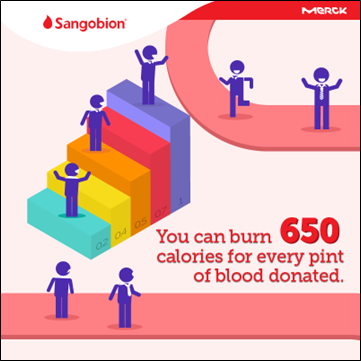Dinesh Parakash A/L Subramaniam and Sharifah Azdiana Tuan Din
Transfusion Medicine, Advanced Medical and Dental Institute, USM
In Malaysia, the national use of blood averaged out to be about 2,000 units per day (1).In other words, there's a lot of blood needed ! Blood transfusion is crucial for saving patients from different life threatening conditions such as severe motor vehicle accidents, cancer and other surgery. In reality, there is no substitute for blood, albeit living in advanced medical society today. Therefore, we largely depend on blood donors to help medical fraternity to provide lifelines to needy patients.
Are you one of the many of those who have fears and doubts in donating blood? Dont worry there are multiple steps taken to ensure the safety of donors. It starts with the pre-donation questionaire, haemogloblin check, weight and blood presseure assessment and then followed by pre- donation counselling by a trained medical personnel. Even after the completion of blood donation, the donors are requested for mandatory rest prior to leaving in addition to the refreshments provided. You should read on why you should pop over to a blood donation drive the next time u see one! We have listed down several benefits of donating blood.
a. Save lives
3 lives can be saved with each unit of blood donated. Blood transfusions are useful in condition where immediate blood transfusion is needed.
 b. Malaysia blood donor privilege
b. Malaysia blood donor privilegeDo you know? In Malaysia, blood donors enjoy different medical benefits depending on the number of times they have donated their blood. The benefit can be referred to in the table below.
 c. Burn calories
c. Burn caloriesYes! Blood donation can help to get rid of calories! Of course, you won't be slim after doing this, however research has shown that donating 568ml (1 pint) of blood can burn up to 650 calories (3).

d. Better cardiovascular health
Yes! Researchers in determined that blood donation had a long-term protection against cardiovascular disease (4).
e. Lower risk of getting cancer
If you donate blood, your body will have less iron to store. Studies have linked iron to free radicals that might cause cancer. Research has shown that the risk of cancer was reduced for those who donate blood 2 times a year compared to those who did not donate (5).
f. Promote Blood Cell Development
Your body's natural response to blood donation is to begin replacing the blood it has lost. This will help keep you healthy by increasing the rate at which new blood cells are produced in your bone marrow.
g. Maintain blood iron level
Haemoglobin, which is part of our blood, is made of iron. When there is too much iron in the body, it can build up in different organs and change how they work. So, by donating blood, not only do we achieve a balanced iron level in our body but we also help other people along the way !!
Donating blood benefits both donors and receivers, therefore why not? Let's become one of the blood donors today!
References:
1. Bernama. Blood supply sufficient, but constant supply of donations still required [Internet]. NST Online. 2022 [cited 2022 Dec 31]. Available from: https://www.nst.com.my/news/nation/2022/09/830711/blood-supply-sufficient-constant-supply-donations-still-required
2. Official Portal University Malaya Medical Centre [Internet]. [cited 2022 Dec 31]. Available from: https://www.ummc.edu.my/pesakit/blood-PRIVILEGE.asp?kodBM=
3. Shea S, Giles S. An intercultural and semi-confessional reflection on blood donation. CMAJ Can Med Assoc J [Internet]. 2010 Dec 14 [cited 2022 Dec 31];182(18):2008–9. Available from: https://www.ncbi.nlm.nih.gov/pmc/articles/PMC3001512/
4. Salonen JT, Tuomainen TP, Salonen R, Lakka TA, Nyyssönen K. Donation of blood is associated with reduced risk of myocardial infarction. The Kuopio Ischaemic Heart Disease Risk Factor Study. Am J Epidemiol. 1998 Sep 1;148(5):445–51.
5. Zacharski LR, Chow BK, Howes PS, Shamayeva G, Baron JA, Dalman RL, et al. Decreased Cancer Risk After Iron Reduction in Patients With Peripheral Arterial Disease: Results From a Randomized Trial. JNCI J Natl Cancer Inst [Internet]. 2008 Jul 16 [cited 2022 Dec 31];100(14):996–1002. Available from: https://doi.org/10.1093/jnci/djn209






